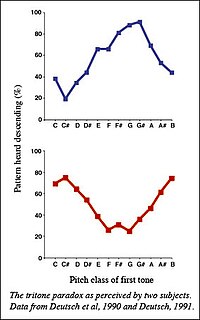Tritone paradox

The tritone paradox is a kind of musical illusion that makes our brains think different things depending on how we hear certain sounds.
Imagine you have a piano with 12 keys, and you start playing the notes in order, from the lowest to the highest. When you get to the 6th and 7th keys, you play two notes that are 6 steps apart from each other, and together they form what musicians call a tritone. This is a very specific kind of sound that sounds a bit funny, and is often used in music to create tension or suspense.
Now, some people will hear the tritone as a rising sound, almost like a siren going up in pitch. Others will hear it as a descending sound, like a siren going down in pitch. It's not really clear why our brains interpret these sounds differently from one person to another, but it has to do with how we process auditory information in our brains.
So, imagine you have two people listening to the same piano playing a tritone. One person hears it going up, while the other hears it going down. They might argue with each other about who's right, but the truth is that both of them are hearing the same sound, just in a different way. This is what makes the tritone paradox so interesting - it shows us that what we hear is not always what is actually there.
Imagine you have a piano with 12 keys, and you start playing the notes in order, from the lowest to the highest. When you get to the 6th and 7th keys, you play two notes that are 6 steps apart from each other, and together they form what musicians call a tritone. This is a very specific kind of sound that sounds a bit funny, and is often used in music to create tension or suspense.
Now, some people will hear the tritone as a rising sound, almost like a siren going up in pitch. Others will hear it as a descending sound, like a siren going down in pitch. It's not really clear why our brains interpret these sounds differently from one person to another, but it has to do with how we process auditory information in our brains.
So, imagine you have two people listening to the same piano playing a tritone. One person hears it going up, while the other hears it going down. They might argue with each other about who's right, but the truth is that both of them are hearing the same sound, just in a different way. This is what makes the tritone paradox so interesting - it shows us that what we hear is not always what is actually there.
Related topics others have asked about:
